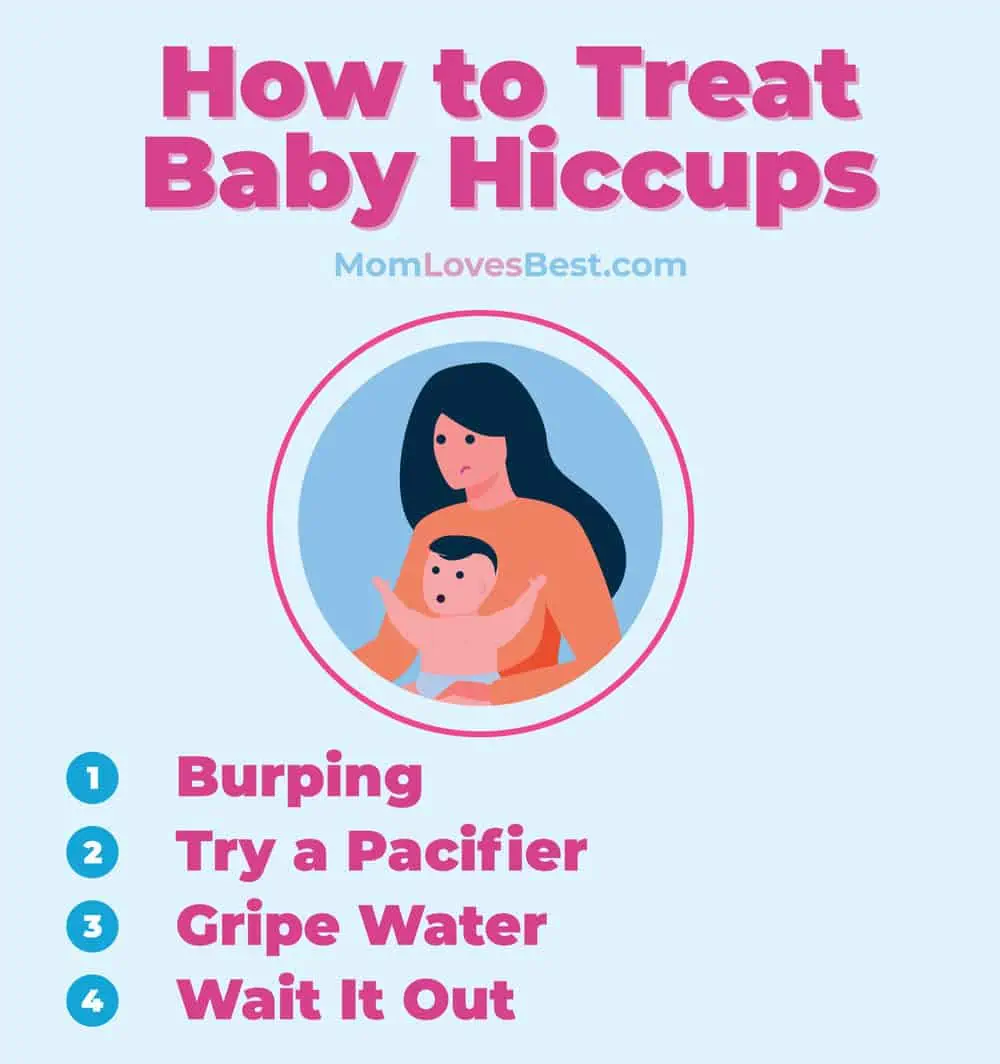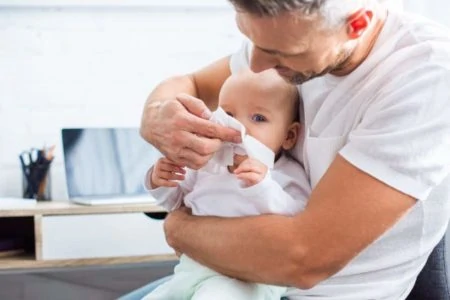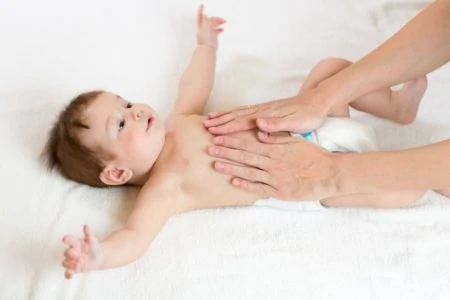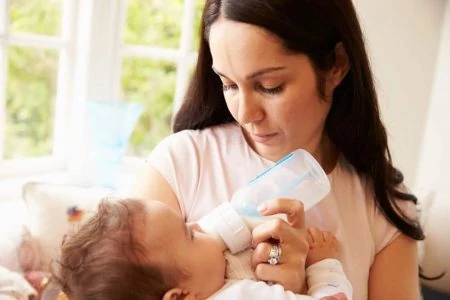During your first year as a parent, you’ll experience your fair share of baby illnesses and other ailments. You’ll also get the good stuff — a time when you get to watch first-hand all the cute stuff your baby does.
When it comes to hiccups, responses are mixed. Some parents react with an “aww,” while others get worried.
Baby hiccups aren’t a reason to go to the emergency room, but as all adults know, they can be annoying. When we experience hiccups, we want to stop them as quickly as possible, but you might wonder how to get rid of baby hiccups.
Key Takeaways
- Baby hiccups are caused by diaphragm spasms, usually from overfeeding, swallowing excess air, or temperature changes.
- To treat baby hiccups, try burping your baby during feedings, using a pacifier, or waiting for them to stop on their own.
- Baby hiccups are common and not harmful, but consult a pediatrician if they become frequent or cause distress.
- To prevent hiccups, keep your baby calm during feedings, hold them upright after eating, and avoid playtime right after meals.
What Causes Baby Hiccups?
It’s not surprising that baby hiccups aren’t that different from the kind adults get. Hiccups occur when the diaphragm begins to spasm. The diaphragm is a thin, skeletal muscle that sits between the chest and abdomen. As we breathe, it moves up and down (1).
Once the diaphragm starts to spasm, the vocal cords shut quickly. This forces excess air out through them, triggering that hiccup sound.
It’s still unknown exactly why hiccups occur. The diaphragm works on the brain’s command, so when hiccups happen, the brain tells the membrane to shift downward forcefully. However, why it sends those signals remains a mystery (2).
Most babies tend to get hiccups while eating. This can happen if your little one overfeeds, swallows excess air, or eats too fast.
Any of these can cause your baby’s tummy to expand, which pushes it against the diaphragm. That can cause spasms resulting in hiccups (3).
At other times, babies get hiccups out of the blue. In such cases, you may consider the three following causes.
Other Causes of Baby Hiccups
1. Temperature Changes
Sometimes sudden changes in stomach temperature can trigger hiccups. It may occur if you feed your baby cold milk followed by something warm or vice versa. It’s generally not a cause for concern.
2. Gastroesophageal Reflux (GER)
If you notice that hiccups are often accompanied by distress, it could be an underlying condition like gastroesophageal reflux (GER).
GER occurs when food that’s been partially digested moves back up the food pipe together with stomach acids. Due to the acidity, the upward-moving food irritates the diaphragm, triggering spasms and resulting in hiccups.
GER is rarely a severe issue for babies; it typically resolves itself after 12 months of age. As long as your baby is growing, content, and happy, there’s no need for worries (4). If you’re concerned, consult your pediatrician.
Sometimes, though, hiccups can occur during episodes of painful reflux, called gastroesophageal reflux disease (GERD) (5).
Other alarming symptoms that require a doctor’s visit are listed below. Call your doctor if your baby experiences any of these:
- Constantly spits up forcefully (projectile vomiting).
- Spits up fluids that are yellow or green.
- Refuses food.
- Isn’t gaining weight.
- Spits up blood resembling coffee grounds.
- Has blood in the stools.
- Has a chronic cough or difficulty breathing.
- Is irritable following a feed.
3. Removement of Excess Air
In a 2012 study, researchers found that hiccups could occur as a way to remove excess air from the stomach. According to that study, when your baby feeds, the air they swallow enters the stomach, triggering spasms. The diaphragm then forcefully moves downward, releasing the air, much like a burp (6).
How to Treat Baby Hiccups
1. Burping
While feeding your baby, taking frequent breaks to burp them might help stop the hiccups. Since an expanding stomach may cause hiccups, it’s a good idea to try to minimize this.
Burping will eliminate most of the excess gas and air that could trigger this annoyance (7).
It’s best to burp your child during feeding rather than only burping them after (8). If you’re breastfeeding, try burping your baby every time you switch breasts. If your little one is bottle-fed, take time to burp them every 2 to 3 ounces or at least halfway through the feeding for very vigorous eaters.
Burping is also beneficial if your baby tends to spit up. Placing them in an upright position may prevent GER (9).
2. Try a Pacifier
Feedings are not always the cause of baby hiccups. Sometimes, they will start spontaneously. If this occurs, a pacifier might help.
As your little one sucks on the pacifier, it relaxes the diaphragm, which can stop the hiccups. If you don’t have a pacifier, use your little finger. Just ensure you clean it thoroughly before.
Turn your hand palm-side up, allowing the nail-free side to rest on the roof of your baby’s mouth (10).
If your little one isn’t soothed by sucking, don’t force it. The hiccups are likely to stop soon.
3. Gripe Water
Gripe water is a mix of water and selected herbs such as ginger, chamomile, fennel, and cinnamon. You can offer your baby some should the hiccups cause discomfort or distress.
Although there are no studies to prove it’s a successful way of getting rid of baby hiccups, it’s worth a try. Gripe water is often used to treat colic and other tummy discomforts in babies.
Clinically, I have found that there are a variety of versions of “gripe water.” Some of my parents even mention a type that is “from their country,” recommended by another family member. While it is important to be mindful of the ingredients, in general, I do not find that gripe water is effective or helpful. Therefore, I do not recommend gripe water for my patients (11).
Editor's Note:
Dr. Leah Alexander, MD, FAAPKeep In Mind
4. Wait It Out
If the hiccups aren’t annoying you or your baby, you don’t have to do anything about them. Most of the time, hiccups bother the parents more than the baby. As long as the hiccups are not caused by something more serious, they’ll resolve soon enough.
If your baby seems uneasy, they may just be unsure what the hiccups are. The best thing to do is talk or sing to your baby, walk around, or rock them. Distractions work well when dealing with babies.
What Not to Do with Baby Hiccups
1. Don’t Startle Your Child
A sudden scare is an old remedy that many believe gets rid of hiccups successfully. However, it’s not a good method to try on babies. A baby’s neurological development isn’t fully capable of processing unknown sounds, which is why small babies get startled by loud noises.
2. Don’t Pull Their Tongue
Some people think that pulling your baby’s tongue while pressing on the forehead will stop the hiccups. We don’t recommend this. It’s unproven to work, and you could hurt or distress your little one.
3. Don’t Serve a Glass of Water
Water is often a go-to remedy when combating hiccups. However, you should limit the amount of water you give your baby. If your little one is under 6 months, avoid giving anything other than breast milk or formula (13).
4. Switch the Infant Formula
There are many formulas on the market with claims from their manufacturers purporting that they solve a variety of infant “problems.” This leads some parents to believe that a formula change will reduce hiccups. Unfortunately, this is not the case. Changing the infant formula will make no difference in the frequency of hiccups (14).
Are Hiccups Bad for a Baby?
Baby hiccups are common during their first year of life. Some babies even get them while still inside the womb. Although you probably won’t notice it, it’s not unusual for babies to hiccup as early as the first trimester (15).
Hiccups aren’t bad for your baby — they’re a natural reaction to something occurring in their tummy. Hiccups are so natural that many babies will sleep through a bout without noticing. It’s often us parents who feel distressed or annoyed by that frequent “hic” sound.
When to Worry About Baby Hiccups
If your baby’s hiccups become increasingly frequent, lasting longer than usual, take note of how long each bout lasts and the time between them.
Consult your pediatrician with the results to verify if intervention is necessary.
Another cause of concern is when the hiccups begin to interfere with your baby’s sleep. When the bouts are so severe they keep your baby awake, it’s time to call the doctor.
We always recommend contacting your pediatrician if you feel concerned, especially if you feel that your baby is experiencing pain during hiccups. This could be a sign of infant GERD. In adults, chronic hiccups can be signs of damage to the nervous system, tumors, kidney disease, and even diabetes (16).
These aren’t typical causes of baby hiccups, but it’s worth a check if you’re worried.
How to Prevent Hiccups
Preventing baby hiccups isn’t always easy, particularly when they occur out of the blue. Still, here are some things you can try:
- Keep your baby calm when feeding: When you’re getting ready to nurse, ensure that they’re relatively calm. The best way to do this is to feed them before they’re starving and crying anxiously for food.
- Place your child in an upright position: After feeding your little one, place them in an upright position, similar to when burping them. Keep them like this for about 20 to 30 minutes after each meal.
- Wait with tummy time: Avoid doing tummy time right after a feeding. Wait at least 30 minutes to let the food settle.
- Hold the play: Wait at least 30 minutes before you begin playing with your little one after feeding.
FAQs
The Takeaway
Baby hiccups are a common occurrence. The earliest a baby might experience a hiccup is during the first trimester in the womb.
Baby hiccups are caused by diaphragm spasms, which can be triggered by overfeeding, air in the stomach, or even temperature changes. Getting rid of baby hiccups is easy by burping during feedings or using a pacifier. Often the problem will resolve quickly on its own.
If you have concerns, always contact your pediatrician. Meanwhile, the next time your baby has the hiccups, get out your phone and start recording. They’ll laugh years from now when they see it.









